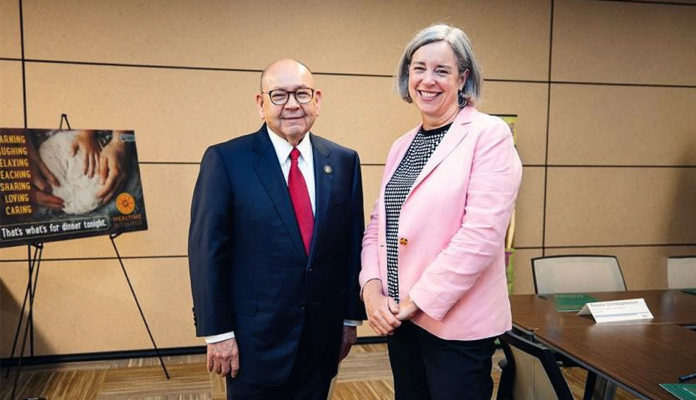
ADA, OK – The Chickasaw Nation recently hosted U.S. Department of Agriculture (USDA) Deputy Under Secretary Stacy Dean to learn more about the Nation’s ongoing nutrition programs and best practices.
“The more we understand about nutrition and its role in overall health and wellness, the more we comprehend the importance and value to families and individuals in our communities,” said Chickasaw Nation Governor Bill Anoatubby. “I think we all know how hunger and malnutrition can hinder a person’s quality of life, curtail longevity and increase the likelihood of a litany of debilitating ailments.”
Governor Anoatubby referred to the longstanding relationship the tribe has had with the USDA. “Knowing the importance of nutrition, we are extremely grateful for our partnership with USDA – a fruitful, 45-year partnership that dates to 1978 when we first launched the Chickasaw Nation Women, Infants and Children Supplemental Nutrition program (WIC),” said Anoatubby.
USDA’s partnership enables the Chickasaw Nation to offer a wide variety of nutrition programs, including WIC, food distribution, Local Food Assistance Program, SNAP-Ed, summer food program, farmers markets and summer EBT for children. Deputy Under Secretary Dean said one of USDA’s primary thrusts is guaranteeing food security for all and complimented the Chickasaw Nation on the creative approaches it has employed toward that end.
“We have a shared goal of partnership around ensuring that everyone in our country is fed, and fed well, and nourished,” said Dean. “The Chickasaw (Nation) has been an incredibly innovative leader in this. I’m sure your tenure and your leadership inspires these leaders and these incredible folks across the room to be just unbelievable groundbreakers, not just here in your community, but across the nation … We are delighted to be here to learn from you. I want to thank you and your whole team for offering inspiration and for giving them space to do these remarkable things.”
The Chickasaw Nation WIC program serves eligible families with nutritious foods, breastfeeding support and other education resources. Services are designed for pregnant or postpartum women, infants and children up to age five.












































